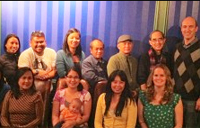A report that looks at why many Filipino youth in Ontario are not completing university was recently submitted to the Ontario Ministry of Training, Colleges and Universities with suggestions as to how change the outcome.
“Promoting Post-Secondary Pathways Among Filipino Youth in Ontario,” it is a collaboration of York University, Community Alliance for Social Justice (CASJ) and other community organizations. The report focuses on Ontario and is a part of the ongoing national Filipino Youth Transitions in Canada (FYTIC) project.
It is authored by members of the FYTIC research team: York University geography Professor Philip Kelly, lead investigator of the project and a research associate at the York Centre for Asian Research; Jennilee Austria; Jeanette Chua; Conely de Leon, a PhD student at York University; Enrico Esguerra; Alex Felipe; Mila Astorga Garcia; Allison Magpayo, a student at York University; Julia Mais, a graduate student at York University; Christopher Sorio; and Ernest Tupe.

In general, the children of immigrants do well – graduating with university degrees and entering professional careers. The pattern is, however, varied across different immigrant communities.
The report analyzed the educational pathways followed by Filipino youth in Ontario. The Filipino community in particular is unusual. Despite having parents with among the highest rates of university degree graduation of all immigrant groups, Filipino youth have among the lowest rates of university completion. This applies particularly to those who arrive in Canada during childhood.
Furthermore, while women have overtaken men in post-secondary educational achievement across all groups, the gender disparity in the Filipino community is especially pronounced. Young Filipino men have among the lowest rates of university graduation of any group.
The FYTIC report identifies a series of factors that explain this situation. First, the authors look at immigrant deprofessionalization and household livelihoods. They argue that the low pay faced by immigrants who cannot work in their field of expertise has implications for the educational trajectory of Filipino youth. This is especially important in cases where a parent has entered Canada under the Live-in Caregiver Program (LCP). University education is unaffordable for many families, especially when placed alongside less expensive, and shorter, college programs. For this reason, post-secondary education has to be made accessible and affordable for those in low-income families.
“At the end of the day, I don’t regret my decision, but it came down to resources, finances. Not being able to afford it [university]. Whereas college was a lot more affordable and it was a shorter program, two years.” (FYTIC focus group with Filipino Youth, Toronto)
The authors also argue for intensified efforts to ensure immigrant access to professions and support for bridging/upgrading programs. They also call for more assistance to those exiting the LCP.
Another set of factors concerns the ways in which youth, and their families, navigate the educational system. Schools and universities need to make greater efforts to engage with the Filipino community and to ensure that its specific needs are met. For example, Filipino newcomer youth who already have strong English skills should not be placed with beginner ESL students. In addition, schools need to work on programming with Filipino community organizations so that youth see their cultural identities reflected in school life.
The study also found that mentoring and role models were an important part of the picture for Filipino youth. Young people need to hear about leaders in their community and to be given opportunities to learn about diverse careers. This is especially true for Filipino boys. The report recommended support for Filipino community organizations to develop mentoring, leadership, networking and internship programs.
The report argues that the role of extended family members is often neglected in immigration policy. For example, grandparents who are not formally employed may be a critical part of the upbringing of young people. In their absence there is far less oversight of young people who, in the Philippines, would have had many eyes upon them. The implication is that family reunification and sponsorship must be a more valued part of Canada’s immigration programs.
A final set of factors concerns the meaning of Filipino identity in Canada. Filipinos have both historically and currently been integrated into lower-status occupations in Canada and other global settings. This means that youth do not see, or imagine, people like themselves in higher-level jobs. This leads to lowered expectations and aspirations.
“I have students who could do something, they could be something, but they say, ‘Well why, because all Filipinos just end up as cleaners anyway’. And that’s a really scary thing to believe when you’re 17 or 18 – that’s there’s no reason to try.” (FYTIC interview, high school settlement counselor)
The report recommended that more Filipino teachers should be recruited into the school system, especially in Catholic boards. As well, schools need to develop programs, in collaboration with Filipino community organizations that provide parents with the tools to recognize and address identity issues with their children. Tagalog heritage language programs should be expanded, with encouragement and incentives for youth to enrol, and curriculum content should ‘mainstream’ examples from the Philippines and Filipino culture.
For more information or to read this and other reports, visit the FYTIC project website.
By Philip Kelly, lead investigator of the national Filipino Youth Transitions in Canada project



Comments are closed.